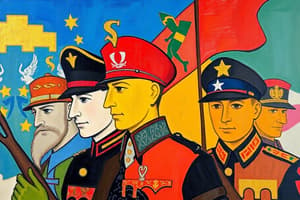Podcast
Questions and Answers
What was a significant reason for referring to the Balkans as the 'powder keg of Europe'?
What was a significant reason for referring to the Balkans as the 'powder keg of Europe'?
- There was a large military presence from major powers.
- The Balkans had a singular ethnic identity.
- The region was economically stable and peaceful.
- Small conflicts in the region could escalate into larger wars. (correct)
What was one of Austria-Hungary's main objectives in the Balkans before World War I?
What was one of Austria-Hungary's main objectives in the Balkans before World War I?
- To support Slavic unity across the region.
- To expand its empire by conquering Serbia.
- To promote democracy among the Balkan states.
- To suppress independence movements and maintain control. (correct)
How did the notion of Pan-Slavism affect Russia's foreign policy prior to World War I?
How did the notion of Pan-Slavism affect Russia's foreign policy prior to World War I?
- It led to a permanent alliance with Germany.
- It decreased Russian military spending in favor of diplomacy.
- It motivated Russia to lead and support Slavic nations against Austria-Hungary. (correct)
- It encouraged Russian isolationism from Balkan conflicts.
What was a key difference between Germany's approach to imperialism and that of Britain and France?
What was a key difference between Germany's approach to imperialism and that of Britain and France?
What role did military buildup, referred to as militarism, play in the lead-up to World War I?
What role did military buildup, referred to as militarism, play in the lead-up to World War I?
How did the alliances formed before World War I contribute to the escalation of tensions?
How did the alliances formed before World War I contribute to the escalation of tensions?
What was the consequence of the 'blank cheque' that Germany provided to Austria-Hungary?
What was the consequence of the 'blank cheque' that Germany provided to Austria-Hungary?
Why did Austria-Hungary's ultimatum to Serbia lead to the outbreak of war?
Why did Austria-Hungary's ultimatum to Serbia lead to the outbreak of war?
Flashcards
Why was the Balkans known as the 'powder keg of Europe'?
Why was the Balkans known as the 'powder keg of Europe'?
The Balkans were a region with many ethnic groups fighting for independence, leading to frequent conflicts that could quickly escalate into a larger war.
What were Austria-Hungary's main goals in the Balkans?
What were Austria-Hungary's main goals in the Balkans?
Austria-Hungary aimed to suppress independence movements within their empire, particularly fearing Serbia's influence on other groups to rebel.
How did Pan-Slavism influence Russia's actions?
How did Pan-Slavism influence Russia's actions?
Pan-Slavism was the idea that all Slavic people, like those in Serbia, should be united under Russia's leadership. Russia therefore supported Serbia and other Slavic countries against Austria-Hungary.
How was Germany's imperialism different from Britain and France's?
How was Germany's imperialism different from Britain and France's?
Signup and view all the flashcards
How did militarism contribute to tensions?
How did militarism contribute to tensions?
Signup and view all the flashcards
How did alliances contribute to war?
How did alliances contribute to war?
Signup and view all the flashcards
Why was the July Crisis of 1914 important?
Why was the July Crisis of 1914 important?
Signup and view all the flashcards
What was Germany's 'blank cheque' to Austria-Hungary?
What was Germany's 'blank cheque' to Austria-Hungary?
Signup and view all the flashcards
Study Notes
Causes of World War I
- The Balkans were a volatile region, nicknamed the "powder keg of Europe," due to competing ethnic groups vying for independence. Small conflicts had the potential to escalate quickly into larger conflicts.
- Austria-Hungary sought to maintain control over its empire and prevent Serbian independence movements. Fear of Serbian influence on other Slavic groups within the empire was a significant concern.
- Pan-Slavism, the idea of uniting all Slavic peoples, influenced Russia's actions, positioning it as a protector of Slavic nations, particularly Serbia. This led to tensions with Austria-Hungary.
- Germany's aggressive pursuit of colonial territories created conflict with existing colonial powers, notably Britain and France. This competition for resources fueled existing tensions.
- Militarism, with countries building up their armies and weapons, fostered a climate conducive to war. A perception of preparedness and readiness for conflict increased the risk of armed conflict.
- Alliances divided Europe into two opposing sides: the Triple Entente (France, Britain, Russia) and the Triple Alliance (Germany, Austria-Hungary, Italy). These alliances meant a local conflict risked spreading into a larger, continental war.
- The assassination of Archduke Franz Ferdinand in Sarajevo triggered a chain reaction, with significant consequences within the international political scene. Austria-Hungary's subsequent actions, supported by Germany's "blank cheque," ultimately led Serbia into war.
- Austria-Hungary issued an ultimatum to Serbia that was impossible to fulfill, leading directly to the declaration of war.
- The two-power standard, requiring the Royal British Navy to remain stronger than the combined naval forces of France and Russia, was a factor influencing military spending.
Studying That Suits You
Use AI to generate personalized quizzes and flashcards to suit your learning preferences.




